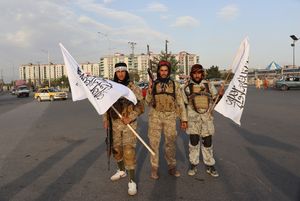August is a month of some significance for India, Pakistan and Afghanistan, incidentally nations with deep historic ties to one another. August 14 and 15 are Pakistan’s and India’s independence day respectively, and August 15, 2021, was the day when Taliban stormed Kabul and re-captured Afghanistan a second time round, two decades after they were ousted from power by the US.
All three countries are also grappling with a similar sociopolitical malaise—religious extremism and mob violence; though few in India would agree with my comparison. Arguably, Afghanistan exhibits the most extreme version of what happens when religious extremism accesses absolute state power. Two years after Taliban 2.0 came back to power predictably with a revised plan to oppress women, the war-ravaged country is reeling from economic hardships, malnourishment of large swathes of the population, lack of proper health care, and an arbitrary, authoritarian and violent government. Women have, of course, been the worst affected, with the Taliban passing 51 decrees relating solely to women in the last two years, effectively banning women from education, employment and travel, and severely limiting their access to health care, rightly prompting accusations of gender apartheid.
Pakistan, too, has suffered the results of the army attempting to use religion to consolidate its powers, appeasing religious extremists and allowing the ISI to (unofficially) nurture terrorist groups. Minorities in Pakistan live in fear and are vulnerable to violence by mobs of religious extremists. Recently, churches and several homes of Christians were burnt by mobs in Jaranwala in Pakistan, in one of the worst attacks on minorities in the country in recent years. Alongside such incidents, the country is also suffering a crippling economic crisis.
India is the most prosperous, stable and progressive of the three countries and is trumpeting its democratic and inclusive growth credentials as it prepares to host world leaders at the G20 summit. But last month, riots broke out near the national capital after authorities failed to restrict movements of a person accused in a triple murder. Muslims have been at the receiving end of calls for economic boycott in Haryana.
Manipur has continued to be embroiled in a sectarian war which was also precipitated by the exclusionary policies of the BJP-led government. Every week new incidents of mob lynchings of minorities are reported and ignored, bills for new laws are introduced and passed in the Lok Sabha with no discussion. We are likely to have a new penal code that replaces sedition with treason and gives our already communalised police forces more extra judicial powers. At the time of writing this article a church in Delhi’s Tahirpur was attacked by armed mobs who thrashed devotees and surrounded a police station chanting pro-Hindu rashtra slogans for hours before an FIR could be filed.
Democracy and growth may be Prime Minister Narendra Modi’s favourite marketing gimmick but the fact is India has never been more similar to Pakistan and Afghanistan in one shameful reality. All three countries share the persecution of minorities by majoritarian mobs. In one aspect India is different. Both the Taliban and the Pakistani army came to power via military coups, but we, forward thinking descendants of a glorious and ancient civilisation, voted for majoritarianism twice! The Afghan people are victims of history, the Pakistanis to some extent victims of their army’s political machinations, but how will history judge Indians? We who have become similar to the nations we once scoffed at because the pleasure of seeing minorities being harassed seems so addictive. How will history judge us, Indians? Perhaps, the Germans can tell us.
The writer is an award-winning Bollywood actor and sometime writer and social commentator.


